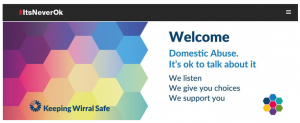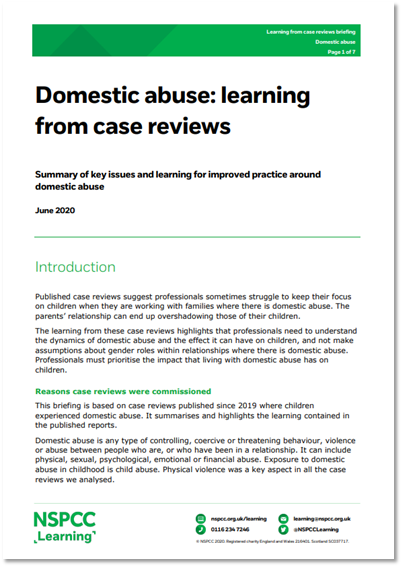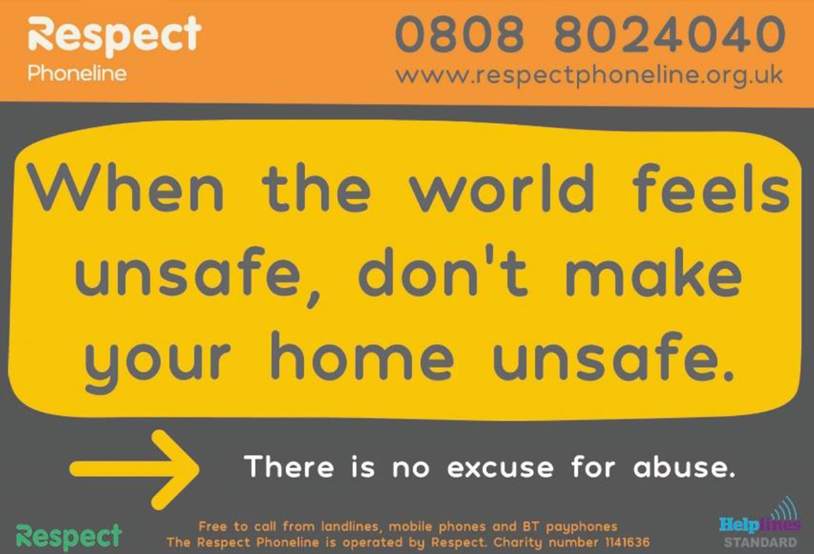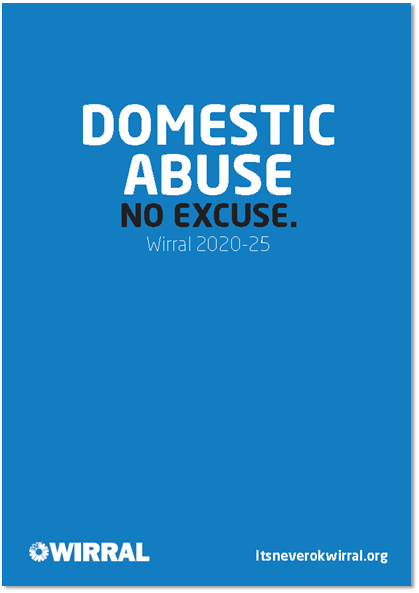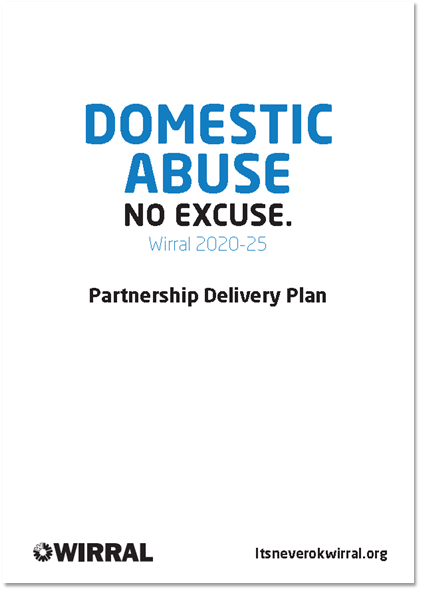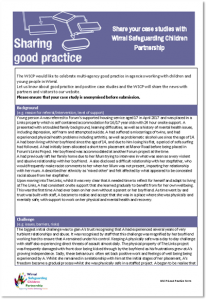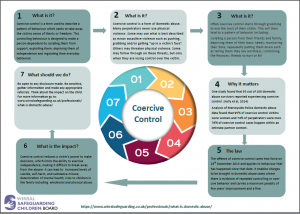Domestic Abuse
Please also see the ItsNeverOKWirral website:
Domestic Abuse includes any incident or pattern of incidents of controlling, coercive or threatening behaviour, violence or abuse between those aged 16 or over who are or have been intimate partners or family members regardless of gender or sexuality. This can encompass but is not limited to the following types of abuse:
- Psychological;
- Physical;
- Sexual;
- Financial;
- Emotional.
The Domestic Abuse Act (2021) introduced into law that children who have witnessed or been exposed to domestic abuse are victims in their own right. A 7 minute briefing and presentation about the 2021 Act can be found below and by clicking here.
Controlling behaviour is: a range of acts designed to make a person subordinate and/or dependent by isolating them from sources of support, exploiting their resources and capacities for personal gain, depriving them of the means needed for independence, resistance and escape and regulating their everyday behaviour.
Coercive behaviour is: an act or a pattern of acts of assault, threats, humiliation and intimidation or other abuse that is used to harm, punish, or frighten their victim.
This definition, which is not a legal definition, includes so called ‘Honour’ Based Violence, Female Genital Mutilation (FGM) and Forced Marriage, and is clear that victims are not confined to one gender or ethnic group.
Learning from Case Reviews and the Domestic Homicide Project (published April 2025)
The National Policing Vulnerability Knowledge and Practice Programme (VKPP), published its fourth annual report in March 2025. The report uses data deriving from the Domestic Homicide Project. The resulting informational matrix, has allowed the creation of an excellent picture of risk indicators and victim/perpetrator demography. Due to the VKPP’s unique access to data, death information from this report is more detailed than that available from any non-government aligned source. The report is well worth a look, and is filled with information which can aid us to respond to domestic abuse, understand domestic homicide and help us better understand victim responses. If interested in this report, please follow the link : https://www.vkpp.org.uk/vkpp-work/domestic-homicide-project/
The NSPCC has published a briefing based on case reviews published since 2019 where children experienced domestic abuse. The briefing summarises and highlights the learning contained in the published reports, and can be accessed by clicking the image below:
The Domestic Abuse Act 2021
April 2021 saw the publication of the Domestic Abuse Act (2021). The aim of the Act is to ensure that domestic abuse is properly understood and that it is considered unacceptable behaviour that will be challenged in the Courts and in the minds of the public.
The new Act supports the view that domestic abuse can take many forms. The legal definition now incorporates a range of abuses beyond physical violence, including emotional, coercive or controlling behaviour and economic abuse. The abuse can be behaviour consisting of a single incident or a course of conduct.
The new Act will also provide further protection to the millions of people who experience domestic abuse, as well as strengthen measures to tackle perpetrators.
The full Act can be accessed by clicking here.
The government published statutory guidance in July 2022. This can be downloaded here.
A 7 Minute briefing poster and presentation can also be downloaded below:
Poster:
7 Minute Briefing Domestic Abuse Act 2021 (Updated April 2025)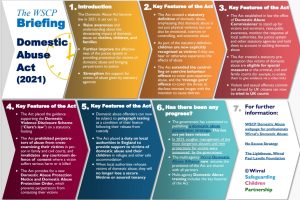
The Domestic Violence Disclosure Scheme
The Domestic Violence Disclosure Scheme (DVDS) – often referred to as
“Clare’s Law” after the tragic case of Clare Wood, who was murdered by her former
partner in Greater Manchester in 2009, gives members of the public a formal mechanism to make enquiries about an individual who they are in a relationship with, or who is in a relationship with someone they know, where there is a concern that the individual may be violent towards their partner. This scheme adds a further dimension to the information sharing about children where there are concerns that domestic violence and abuse is impacting on the care and welfare of the children in the family.
Members of the public can make an application for a disclosure, known as the ‘right to ask’. Anybody can make an enquiry, but information will only be given to someone at risk or a person in a position to safeguard the victim. The scheme is for anyone in an intimate relationship regardless of gender.
Partner agencies can also request disclosure is made of an offender’s past history where it is believed someone is at risk of harm. This is known as ‘right to know’.
If a potentially violent individual is identified as having convictions for violent offences, or information is held about their behaviour which reasonably leads the police and other agencies to believe they pose a risk of harm to their partner, a disclosure will be made.
Help for those Concerned about their own Behaviour
Respect Phoneline
The Respect Phoneline is a key source of support for people concerned about their behaviour and wanting to manage and change it. We need them to know that support is out there and that there is no excuse for abuse.
If you are struggling with your own behaviour at home please contact the Respect Phoneline using the contact information below:
• website: www.respectphoneline.org.uk
• call: 0808 8024040
• opening times: Mon-Fri 9am-5pm
• webchat: Thurs & Fri 10am-11am & 3pm-4pm
• email: [email protected]
Who to contact
If you, your child or anyone in the family are at immediate risk of harm, you should contact the police urgently, CALL 999. If you are a Wirral resident and are experiencing domestic abuse or believe someone you know is, please contact Wirral Integrated Front Door: 0151 606 2008 (Monday to Friday 9am-5pm). Outside of these hours please call the Emergency Duty Team on 0151 677 6557.
www.victimcaremerseyside.org
www.itsneverokwirral.org/
Further support
DOMESTIC ABUSE NATIONAL HELPLINES
Economic-abuse-and-the-coronavirus-outbreak-1
Wirral Family Safety Unit: Independent Domestic Violence Advisors will continue to offer telephone support to victims of domestic abuse, and to all victims where risk of ‘harmful practices’ needs to be explored (forced marriage, honour-based abuse and female genital mutilation (FGM). Call an advisor on 0151 666 4914.
The Family Safety Unit are continuing to offer support to clients via telephone and email. IDVAs are continuing to safety plan with clients and where appropriate referring clients to outside agencies. The Family Safety Unit continue to accept new referrals from all agencies and self-referrals.
Safelives Safety Planning Professionals Guidance
MARAC will take place via conference call every Wednesday from 1st April 2020.
Tomorrow’s Women Wirral: The team is in regular contact with women during this difficult time. Please call 0151 647 7907 if you need help, and one of the team will offer advice and a listening ear.
Wirral Women and Children’s Aid: Provides a 24/7 helpline. Please call 0151 643 9366 for guidance and support. Women’s Aid: https://www.womensaid.org.uk/information-support/
National Domestic Violence Helpline: 0808 2000 247 (24 hours).
Worst Kept Secret Helpline: 0800 028 3398.
Refuge: (includes information for men) | refuge.org.uk | 0808 200 0247 (24 hours) The Men’s Advice Line, for male domestic abuse survivors: 0808 801 0327.
National LGBT+ Domestic Abuse Helpline: 0800 999 5428.
Samaritans (24/7 service): 116 123.
Domestic Abuse and Children
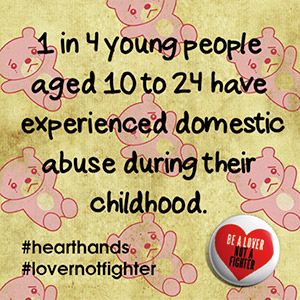 The issue of children living with Domestic Violence and Abuse is recognised as a matter for concern in its own right by both government and key children’s services agencies. The link between child Physical Abuse and Domestic Violence is high, with estimates ranging between 30% to 66%. Hence the recent 2021 Act defining that children experiencing or witnessing Domestic Abuse must be considered victims.
The issue of children living with Domestic Violence and Abuse is recognised as a matter for concern in its own right by both government and key children’s services agencies. The link between child Physical Abuse and Domestic Violence is high, with estimates ranging between 30% to 66%. Hence the recent 2021 Act defining that children experiencing or witnessing Domestic Abuse must be considered victims.
In 2002, nearly three quarters of children subject of a Child Protection Plan lived in households where Domestic Violence and Abuse occurs
Children living in a family environment where there is Domestic Violence and Abuse are at risk whether or not they have directly witnessed the abuse. Some children living with Domestic Violence and Abuse are at risk of Significant Harm.
A key concern in safeguarding children and young people is the potential for long term emotional damage caused by the presence of Domestic Violence and Abuse during early formative years. Children can witness and be affected by Domestic Violence and Abuse from all corners of the household, and over 90% are aware of it happening.
The poster below includes 5 key facts related to domestic abuse in the UK:
Key facts relating to domestic violence and abuse in the UK
Combatting Domestic Abuse
Wirral Council and its partners have published a new Domestic Abuse Strategy and Partnership Deliver Plan for 2020-25. Both documents can be downloaded below:
For professionals the WSCP has also published its Responding to Children and Young People who are at Risk from Domestic Violence and Abuse – Policy and Guidance document. This is available on the WSCB procedures website and can be accessed here:
HM Government multi-agency statutory guidance on FGM (published April 2016):
Multi-agency Statutory Guidance on FGM
What Difference it Makes
The WSCP is publishing case studies which highlight good and effective practice. If you would like to submit a Case Study please use the WSCP template and send your case study to us here. Received case studies will be published below.
Tools for Assessing Domestic Violence and Abuse
Domestic Abuse, Stalking, Honour-based violence – Risk Identification Checklist (DASH or RIC) – tool to help identify adult victims of domestic violence and abuse
When would you use it?
- There is evidence of potential domestic abuse within a household, is it significant?
- “A woman seems to be being stalked by her ex-partner. It appears he has been harassing her and there are domestic abuse concerns – does he pose a risk to her?”
What is it?
- The purpose of the Dash risk checklist is to give a consistent and simple tool for practitioners who work with adult victims of domestic abuse in order to help them identify those who are at high risk of harm and whose cases should be referred to a Multi-Agency Risk Assessment Conference (MARAC) meeting in order to manage their risk. The score provides evidence required to refer to Family Safety Unit.
- Whilst domestic abuse is most often perpetrated by men towards women in an intimate relationship such as boyfriend/girlfriend, husband/wife, this checklist can also be used for lesbian, gay, bisexual relationships and for situations of ‘honour’-based violence or family violence.
- If you are concerned about risk to a child or children, following the completion of a DASH you should make a referral to ensure that a full assessment of their safety and welfare is made.
DASH including Stalking and Harrassment questions_
Barnardo’s Domestic Violence Risk Identification Matrix (DV RIM)
The DV RIM tool is designed to help professionals assess the risk to children from the impact of domestic abuse between adults
The tool enables practitioners to assess the level of risks to children from male and female domestic abuse. The sheet contains a list of risk factors, vulnerabilities and protective factors which helps practitioners recognise whether a child is at moderate, serious or severe risk.
Multi-agency Risk Assessment Conference (MARAC) – support for victims
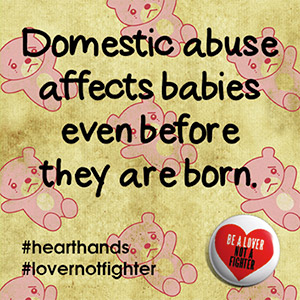 A MARAC is a multi-agency meeting which has the safety of high risk victims of domestic abuse as its focus. It involves the participation of all the key statutory and voluntary agencies who may be involved in supporting a person experiencing domestic abuse.
A MARAC is a multi-agency meeting which has the safety of high risk victims of domestic abuse as its focus. It involves the participation of all the key statutory and voluntary agencies who may be involved in supporting a person experiencing domestic abuse.
In Wirral support is most frequently provided by the Independent Domestic Violence Advocate (IDVA) based within the Family Safety Unit. The IDVA is a specialist advisor who has received accredited training to work with high risk victims of domestic abuse from the point of crisis.
The MARAC will identify “high risk” victims/survivors of domestic violence, and will offer professional support and guidance, which will reduce the threat of further harm and repeated domestic violence to the victim/survivor and their immediate family members.
Referral – All WSCP partner agencies have a designated point of contact for the Wirral MARAC. Where domestic abuse is disclosed or suspected the point of contact in each agency will follow the Domestic Abuse referral pathway to ensure appropriate action is taken to safeguard individuals and refer into MARAC.
Domestic Abuse Campaigns
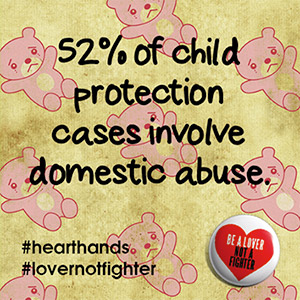 Having a Zero Tolerance to Domestic Abuse is an aim of the partnership in Wirral through the Wirral Council’s 2020 Vision. The WSCB and partner agencies are currently supporting the Be a Lover not a Fighter campaign which has been promoted through social media, with advertising material in partner agencies and through high profile public advertising such as messages on buses and in the press.
Having a Zero Tolerance to Domestic Abuse is an aim of the partnership in Wirral through the Wirral Council’s 2020 Vision. The WSCB and partner agencies are currently supporting the Be a Lover not a Fighter campaign which has been promoted through social media, with advertising material in partner agencies and through high profile public advertising such as messages on buses and in the press.
Key messages from the campaign can be seen throughout this page.
Two learning posters about Forced Marriage and Honour Based Violence for professionals are included here:
Forced Marriage
Honour Based Violence
Click on the picture below for a seven minute briefing on coercive control:
Training for professionals on Domestic Abuse can be found here

